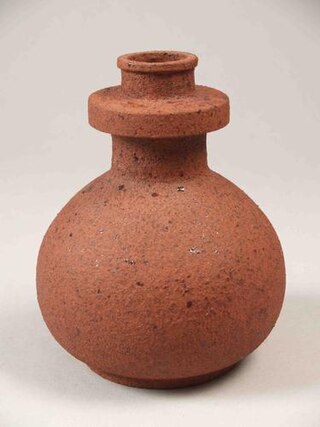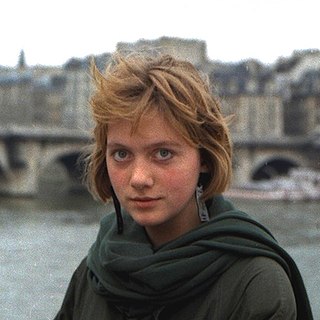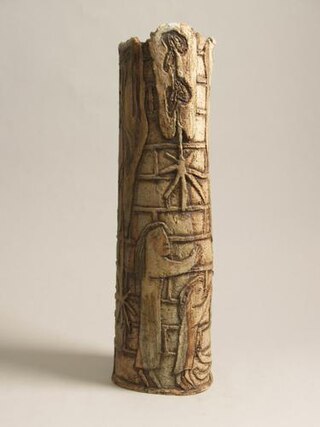
Henk Trumpie (born The Hague, 8 August 1937) was a Dutch ceramist and sculptor.[ citation needed ]

Henk Trumpie (born The Hague, 8 August 1937) was a Dutch ceramist and sculptor.[ citation needed ]
Born in The Hague, Trumpie studied at the Royal Academy of Art, The Hague, and took glaze lessons at the Porceleyne Fles pottery in Delft, where he was involved in the production of ceramic works for other artists, such as Karel Appel. [1]
In 1969, he and Jacques van Gaalen founded the ceramics studio Struktuur 68. Gwen Heeney (2003) recalled, that "the studio has applied itself to the manufacturing of large-scale ceramic sculpture in collaboration with many international artists (many of whom have been unfamiliar with ceramics)". [2] In 1968, they started working with the CoBrA group. Over the years, they "completed around 1000 successful commissions in collaboration with more than 200 national and international artists". [3]
In 1980, Trumpie started as lecturer at the Rietveld Academy, beside Jan van der Vaart, as successor to Emmy van Deventer, which became "an enormous stimulus for the creation of monumental ceramics at the Academy". [4] Among his students were Anna Carlgren, Wietske van Leeuwen and Lia van Rhijn.[ citation needed ]

The Gerrit Rietveld Academie, also known as Rietveld School of Art & Design and Rietveld Academy, is an art academy in Amsterdam, Netherlands. It was founded in 1924 and offers programs in fine arts and design.

The Princessehof Ceramics Museum is a museum of ceramics in the city of Leeuwarden in the Netherlands. The museum's name comes from one of two buildings in which it is housed: a small palace built in 1693 and later occupied by Marie Louise, dowager Princess of Orange. The other annexed building is the Papinga stins, a former stronghold from the 15th century. The museum buildings are of interest, and so are its collection of tiles, pottery, and ceramic sculpture.

Johannes Jacobus (Jan) van der Vaart was an influential Dutch ceramicist from the 20th century, known as founder of the abstract-geometric ceramics in the Netherlands.

Sonja Landweer was a Dutch multi-disciplinary artist, who lived and worked in Ireland for much of her life. Initially a ceramicist, she later also became known for her bronze castings with unique patinations and subtle forms, and painted, and made prints, jewellery and pottery.

Jan de Rooden was a Dutch ceramist and sculptor, who worked in Nijmegen, Paris, and Amsterdam.

Hans de Jong was a Dutch sculptor, designer and ceramist.

Cornelis (Cor) Dam was a Dutch artist, who has been active as sculptor, painter, illustrator and ceramist.
Theodorus Antonius Hubertus Maria (Theo) Dobbelman was a Dutch sculptor, ceramist and painter.

Lia van Rhijn is a Dutch ceramist and sculptor, who makes sculptures of human – and animal figures and architectural forms.

Jan Cornelis Snoeck was a Dutch sculptor and ceramist.

Gerardus Johannes (Geert) Lap was a Dutch ceramist, known for his new approach to ceramics characterized as clay minimalism.

Johan Gerard van Loon was a Dutch ceramist and textile artist.

Vilma Maria Helena Henkelman was a Dutch sculptor, ceramist, and photographer.
Emmy van Deventer-Molt was a Dutch ceramist, and lecturer at the Gerrit Rietveld Academie, and the AKV St. Joost.
Joost (Just) van Deventer was a Dutch ceramist, and lecturer the AKV St. Joost.

Wietske van Leeuwen is a Dutch ceramist, who lives and works in Monnickendam. Her works are constructed in a baroque style, with shells and fruit as recurring motifs.
Barbara Nanning is a Dutch designer, sculptor, monumental artist, ceramist and glass artist.

Johanna Jacoba (Johnny) Rolf is a Dutch ceramist, drawing artist and sculptor.
Gwen Heeney (1952–2016) was a British ceramist, sculptor and academic, known particularly for sculptures created from bricks. Her commissioned sculptures stand in locations in Britain.